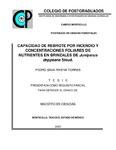Capacidad de rebrote por incendio y concentraciones foliares de nutrientes en brinzales de Juniperus deppeana Steud.
Abstract
A través de un experimento de fertilización (N-P-K) en campo, se evaluó el crecimiento de brinzales de Juniperus deppeana, así como su capacidad de rebrote después de un incendio. Se aplicaron tres niveles de N y P y dos niveles de K, generando 18 tratamientos con seis repeticiones en un diseño completamente al azar. Seis meses después de establecido el experimento, mostró un efecto (P<0.06) en el incremento del diámetro a la base del suelo (IDB) debido a la combinación de los tres nutrimentos. Adicionalmente, se comparó el incremento del IDB en planta de uno y dos años de edad. El efecto de la fertilización no fue significativo para el incremento en altura. Siete meses después de establecido el experimento se presentó un incendio que afectó la plantación. Se replanteó la propuesta de investigación inicial de fertilización y se desarrollaron nuevos objetivos para evaluar el efecto del incendio y fertilización a través de variables indicadoras como el contenido nutrimental del follaje y la capacidad de rebrote post-incendio de los árboles de J. deppeana. El 84% de los árboles con daño por incendio rebrotaron y la fertilización mostró un efecto marginal positivo (P<0.08) en la calidad de rebrote. No hubo diferencias en el contenido nutrimental de los árboles fertilizados ni en el rebrote post-incendio entre brinzales de uno y dos años. Después de 15 meses en los árboles que no fueron afectados por el incendio, se encontró una diferencia estadística (P<0.0001) en el incremento en el diámetro a la base en árboles de uno y dos años, (4.8 y 10.8 mm respectivamente); sin embargo no hubo diferencias en el incremento en altura. _______________ POAT-FIRE REGROWTH CAPACITY AND FOLIAR CONCENTRATIONS OF NUTRIENTS IN SEEDLING OF Juniperus deppeana STEUD. ABSTRACT: Low growth rate forest species are rarely studied. The initial growth of Juniperus deppeana was evaluated through a field fertilization experiment (N-P-K). The post-fire regrowth capacity of the seedling was also evaluated. There levels of N and P and two levels for of K were combined for a total of 18 treatments, using six plant as replicates. Additionally, the increase in the root collar diameter (RCD) was evaluated for one and two-year-old plants. Six months after fertilization, only the N-P-K interaction was statistically significant (P<0-06) for RCD. The highest levels of N matched to highest RCD. After seven months of the establishment of the field experiment, a forest fire occurred, after which the regrowth capacity and the concentrations of macronutrients (N-P-K-Ca-Mg-S) were evaluated, taking into account the fertilization background. The main effects tested in the experiments were, fertilization, seedling age and fire damage. Most of the trees (84%) resprouted after the fire. Plants with a legacy of fertilization had lower nutrients in plant tissue. Post-fire nutrients recovery of J. deppeana is determined by the redistribution of nutrients reserves in the soil and the plant. For slow growing species J. deppeana, plants aged two years old more suitable for reforestation due to their higher growth rates.
Collections
- Tesis MC, MT, MP y DC [289]


